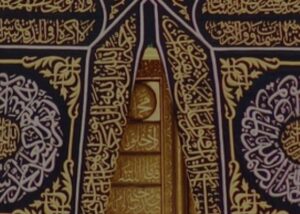Quran
Hadith
Islamic Text
بِسْمِ اللَّهِ الرَّحْمَنِ الرَّحِيمِ
In the Name of Allah Most Merciful Most Kind
Short Answer
To understand if Taweez is shirk or not, we must understand the Hadith which states that Tameemah is Shirk. The term Tameemah can be applicable to certain types of Taweez. However, if a Taweez has Quranic verses, Sunnah supplications and the names of Allah (Most High) then it is certainly not Shirk (polytheism).
“عَنْ عُقْبَةَ بْنِ عَامِرٍ الْجُهَنِيِّ، أَنَّ رَسُولَ اللهِ صَلَّى اللهُ عَلَيْهِ وَسَلَّمَ أَقْبَلَ إِلَيْهِ رَهْطٌ، فَبَايَعَ تِسْعَةً وَأَمْسَكَ عَنْ وَاحِدٍ، فَقَالُوا: يَا رَسُولَ اللهِ، بَايَعْتَ تِسْعَةً وَتَرَكْتَ هَذَا؟ قَالَ: ” إِنَّ عَلَيْهِ تَمِيمَةً ” فَأَدْخَلَ يَدَهُ فَقَطَعَهَا، فَبَايَعَهُ، وَقَالَ: ” مَنْ عَلَّقَ تَمِيمَةً فَقَدْ أَشْرَكَ
(Sayidina) Uqbah bin Amir al-Juhani narrated that a group came to the Messenger of Allah ﷺ. He ﷺ accepted allegiance from nine and withheld it from one of them. They said: O Messenger of Allah ﷺ you accepted allegiance from nine and withheld it from this one? He ﷺ said, ‘Indeed he has a Tameemah (amulet).’ So he inserted his hand and cut it. Then he ﷺ accepted the allegiance. And he ﷺ said, ‘Whoever wears a Tameemah has committed Shirk (polytheism).’ (Musnad Ahmad, 17422).
رَوَاهُ أَحْمَدُ، وَالطَّبَرَانِيُّ، وَرِجَالُ أَحْمَدَ ثِقَاتٌ. (مجمع الزوائد ومنبع الفوائد)
In was narrated by Ahmad and al-Tabaraani. The narrators of Ahmad are sound. (Imam al-Haythami, Majma’ al-Zawaid).
Types of Tameemah
In the Hadith above, we find a general statement of the blessed Prophet ﷺ expressing that Tameemah is Shirk. This statement raises two questions. Firstly, what is Tameemah? Secondly, are all types of Tameemah Shirk?
Scholars of Ahl al-Sunnah have understood Tameemah to refer to three things:
- Protective beads.
- Amulets with other than Quran and Sunnah written on them.
- Amulets generally.
The first two are prohibited. Therefore, the Hadith is applicable to them. However, the third one is permissible if it is limited to Quran and Sunnah. Thus, the Hadith cannot be applied to it. The great Sahabi Sayidina Abdullah bin Amr bin al-Aas would use the third type for his young children (Did the Sahabah use Taweez). For these reasons the scholars of Ahl al-Sunnah did not consider Taweez to be absolutely prohibited.
وَإِنَّمَا كَانَ ذَلِكَ مِنَ الشِّرْكِ لِأَنَّهُمُ أَرَادُوا دَفْعَ الْمَضَارِّ وَجَلْبَ الْمَنَافِعِ مِنْ عِنْدِ غَيْرِ اللَّهِ وَلَا يَدْخُلُ فِي ذَلِكَ مَا كَانَ بِأَسْمَاءِ اللَّهِ وَكَلَامِهِ. (فتح الباري شرح صحيح البخاري)
It was considered Shirk (polytheism) because they wished to ward off harm and bring benefit from other than Allah (Most High). This does not include the names of Allah and His words. (Imam Ahmad bin Ali bin Hajr al-Asqalani, Fath al-Baari Sharh Sahih al-Bukhari).
Prohibited Tameemah
As for the first two types, they fall under the description of Shirk mentioned in the Hadith due to beliefs people may have attached to them. As such, some of these beliefs were highlighted by scholars:
وإنما أطلق الشرك عليها إما لأن المتعارف منها في عهده ما كان معهودا في الجاهلية, وكان مشتملا على ما يتضمن الشرك, أو لأن إيجادها يدل على اعتقاد تأثيرها, وهو يفضي إلى الشرك. (تحفة الأبرار شرح مصابيح السنة)
It was called shirk either because what was prevalent during his ﷺ time was the pre-Islamic practice, which included Shirk. Or because using it indicates belief in its effect which leads to Shirk. (Imam al-Qadi Nasir al-Deen al-Baydaawi, Sharh Masabeeh al-Sunnah).
(شِرْكٌ) جَعَلَ هَذِهِ الثَّلَاثَةَ مِنْ الشِّرْكِ لِاعْتِقَادِهِمْ أَنَّ ذَلِكَ يُؤَثِّرُ بِنَفْسِهِ. (نيل الأوطار)
(Shirk) He rendered these three Shirk due to their belief that they have an intrinsic effect. (Imam al-Shawkani, Nayl al-Awtar).
والمرادُ بالشِّرْك اعتقادُ أنَّ ذلك سببٌ قويٌّ وله تأثير. (شرح مصابيح السنة)
What is meant by (it being) Shirk is the belief that this is a strong cause and has an effect. (Imam Ibn al-Malak, Sharh al-Masabeeh)
The Hanafi position
The Hanafi scholars tended to refer to Taweez that are unacceptable as Haram and not literally Shirk although there is no doubt that it can lead to Shirk. Therefore, one must stay away from them. Not only are they sinful but they can jeopardise one’s Imaan (faith).
وَقَالَ قَاضِي خَانْ امْرَأَةٌ أَرَادَتْ أَنْ تَصْنَعَ تَعَاوِيذَاتٍ لِيُحِبَّهَا زَوْجُهَا بَعْدَمَا كَانَ يَبْغَضُهَا ذَكَرَ فِي الْجَامِعِ الصَّغِيرِ أَنَّ ذَلِكَ حَرَامٌ لَا يَحِلُّ. اهـ. وَلَعَلَّ وَجْهَهُ مَا قَالَ فِي التَّبْيِينِ عَنْ ابْنِ مَسْعُودٍ – رَضِيَ اللَّهُ عَنْهُ – أَنَّهُ قَالَ سَمِعْت رَسُولَ اللَّهِ – صَلَّى اللَّهُ عَلَيْهِ وَسَلَّمَ – يَقُولُ: إنَّ الرُّقَى وَالتَّمَائِمَ وَالتُّوَلَةَ شِرْكٌ. (حاشية الشرنبلالي على درر الحكام)
(Imam) Qadi Khan said: If a woman wants to use Taweez to cause her husband to love her when he dislikes her then it is Haram and not permitted. This was mentioned in al-Jami al-Sagheer. A proof of this may be what he mentioned in al-Tabyeen from (Sayidina) Ibn Masood (May Allah Most High be pleased with him) that he heard the Messenger of Allah ﷺ say: Indeed Ruqyah, Taweez and love-sorcery are Shirk. (Imam al-Shurunbulali, Haashiyah Ala Durar al-Hukaam).
Mixing Halal and Haram
Another concern when using Taweez is people mixing Quranic verses with numbers, shapes or symbols. Many uneducated Muslims are misled by such practices. As such, they see a Quranic verse and then ignore everything else. However, this is unacceptable. If part of the Taweez is not permitted, then it must be rejected in entirety.
وتلك الرقى المنهى عنها التي يستعملها المعزم ممن يزعم تسخير الجن تأتي مركبة من حق وباطل يجمع إلى ذكر أسماء الله وصفاته ما يشوبه من ذكر الشياطين والاستعانة بهم والتعوذ من مردتهم فلذلك نهى. (فيض القدير شرح الجامع الصغير)
That is the forbidden Ruqyah. It is used by utterers and others. He claims to have subjugated the Jinn. He engages in a combination of truth and falsehood. He combines the Dhikr of Allah (Most High) and His Names with corruption, such as mentioning devils, seeking their help, and seeking refuge in their leaders. That is prohibited. (Imam Abd al-Rauf al-Munaawi, Fayd al-Qadeer Sharh al-Jami al-Sahih).
Concluding Remarks
It is unfortunate to see that many scholars provide and even write Taweez that are not limited to Quran and Hadith. Due to this, many people believe them to be permitted or even praiseworthy. This highlights the importance of researching religious matters even if one has taken something from a scholar. All scholars make mistakes at times. Which is why people should study with numerous scholars of varying backgrounds.
And Allah Most High Knows Best.
–Answered by Shaykh Noorud-deen Rashid (23.11.23)






